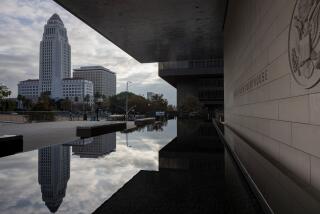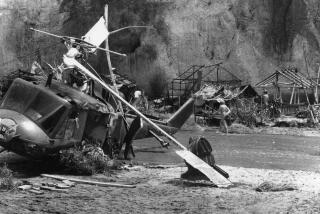Family of Doctor Wins Suit in Fatal Helicopter Crash : Product liability: Jury awards $4.5 million, finding manufacturer partly to blame for mistake that killed O.C. surgeon. Company vows appeal.
- Share via
SANTA ANA — A Superior Court jury awarded about $4.5 million Tuesday to the family of a prominent Orange County surgeon who died in a helicopter crash two years ago, finding that the maker of the aircraft shared some responsibility for the accident.
Although the jury found that Dr. Todd L. Passoff was mostly responsible for the accident, it found that the craft made by Robinson Helicopter Co. had a control panel design defect that contributed to the crash.
The company promised an appeal.
Attorney Wayne Austero, who represented Passoff’s family, contended during the trial that the doctor inadvertently pulled a lever shutting off the fuel to the engine of the helicopter, which stalled and crashed, because the lever was placed dangerously close to other levers needed to fly the aircraft. Austero also contended that the lever’s safety guard was inadequate.
He said he hoped the verdict would prompt a design change in the Robinson model R-22, believed to be the nation’s biggest-selling light helicopter, which is bought by many police departments because it costs only one-sixth as much as the smallest turbojet helicopter built by the larger and better known manufacturers.
“Everybody’s human. Everybody can make a mistake,” Austero said in an interview outside the courtroom. “The product should be designed to take in mind that people operate these. There are human frailties.”
The helicopter company, however, said the craft’s design was not responsible for the crash, and that the fuel mixture lever in question had a plastic safety sleeve to prevent accidents.
“I just feel there were some pressures that Dr. Passoff placed on himself--dedication to his family and medical profession--that didn’t allow him to stay current and proficient as a helicopter pilot,” attorney Allen L. Neelley, who represented Robinson Helicopter Co., said outside the courtroom.
The crash occurred May 8, 1992, just after Passoff lifted off from Anaheim Memorial Medical Center, where he had just completed a knee joint replacement. He was en route to a sports medicine clinic he operated in Temecula. Passoff, 43, lived in Newport Beach with his wife and two young daughters. He had been on the staff of the Anaheim hospital since 1980.
Frank Robinson, owner of the Torrance-based company, said he would appeal the verdict on several points, including what he believes were misleading jury instructions involving product liability law.
“We should not have been any percentage responsible” for the accident, he said.
Robinson said the control panel design challenged in the trial was the “best that you could do.”
“Had the jury known all the facts surrounding that design and the other alternatives, I’m sure they would have found us zero responsible for the accident,” he said.
The jury announced its verdict after a day and a half of deliberations. A replica of the helicopter cockpit was among evidence considered during trial, which lasted almost two weeks.
Jurors Julie White of Yorba Linda and Charmaine Peterson of Newport Beach said they spent eight hours deciding whether the helicopter controls in question were poorly designed. Once the majority agreed that a defect existed, the hardest issue was dividing responsibility for the accident, they said.
“It was tough,” White said. “You’re dealing with not only negligence or a design defect, but negligence on the pilot’s part.”
The case also carried an emotional toll, they added. “No amount is worth losing a loved one,” White said.
In calculating the award, the jury included about $19.5 million in economic damages and $3 million in non-economic damages, but found the helicopter manufacturer liable for only 20% of the total.
Among witnesses called by the Passoff family was Jerry Wells, an expert at investigating plane crashes. He testified that the helicopter would have been safer if the fuel mixture control lever, which regulates the flow of fuel from the carburetor to the engine, had been placed in a more remote location in the cockpit.
About 2,500 Robinson R-22 helicopters have been sold since the Federal Aviation Administration certified the aircraft in 1979. The craft sells for about $115,000.
Robinson said this is the first R-22 product liability lawsuit the company has ever lost, and that there has not been a single report of a pilot, other than Passoff, pulling the wrong control since the company added the plastic safeguard 12 years ago.
More to Read
Inside the business of entertainment
The Wide Shot brings you news, analysis and insights on everything from streaming wars to production — and what it all means for the future.
You may occasionally receive promotional content from the Los Angeles Times.










